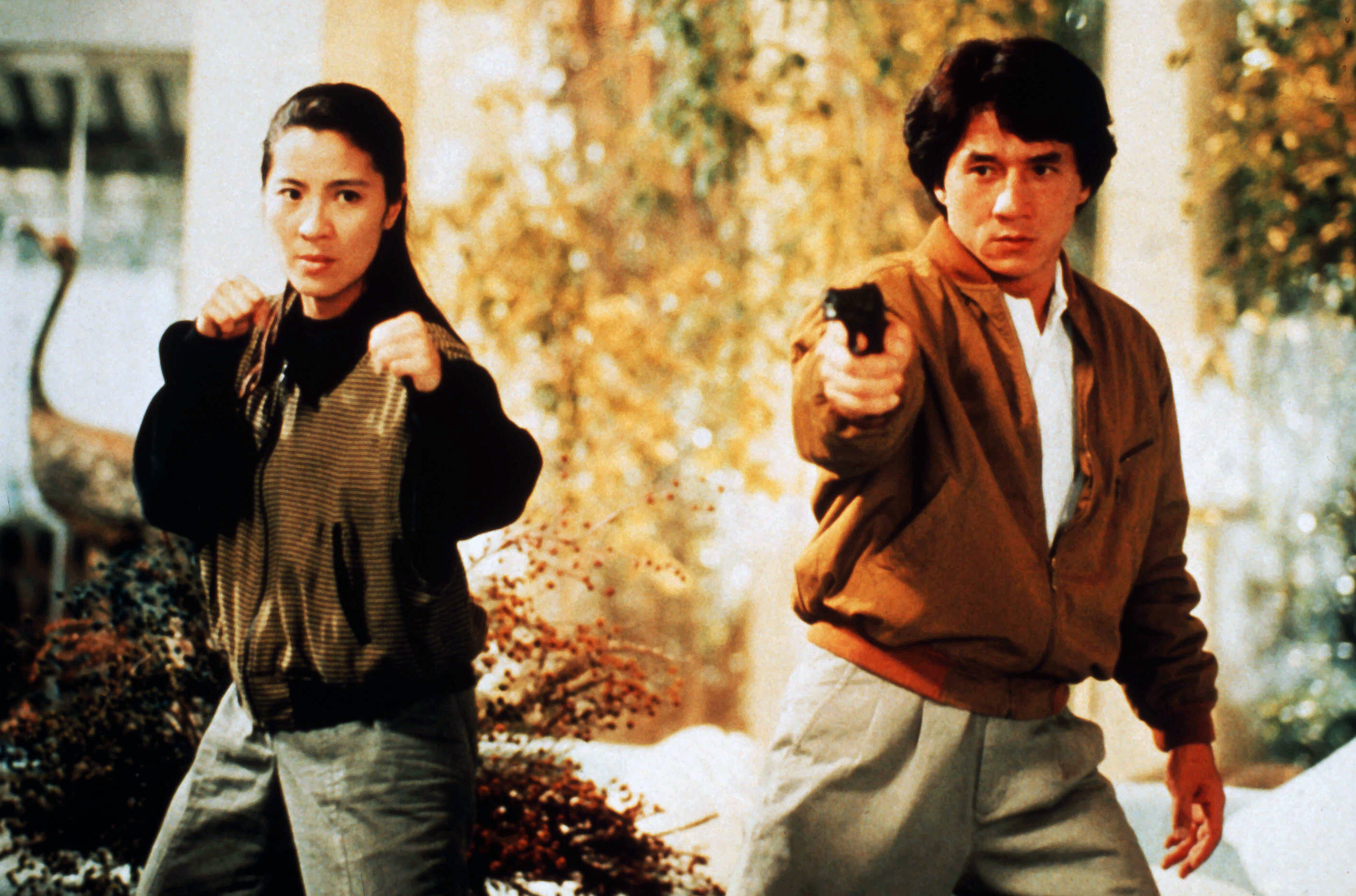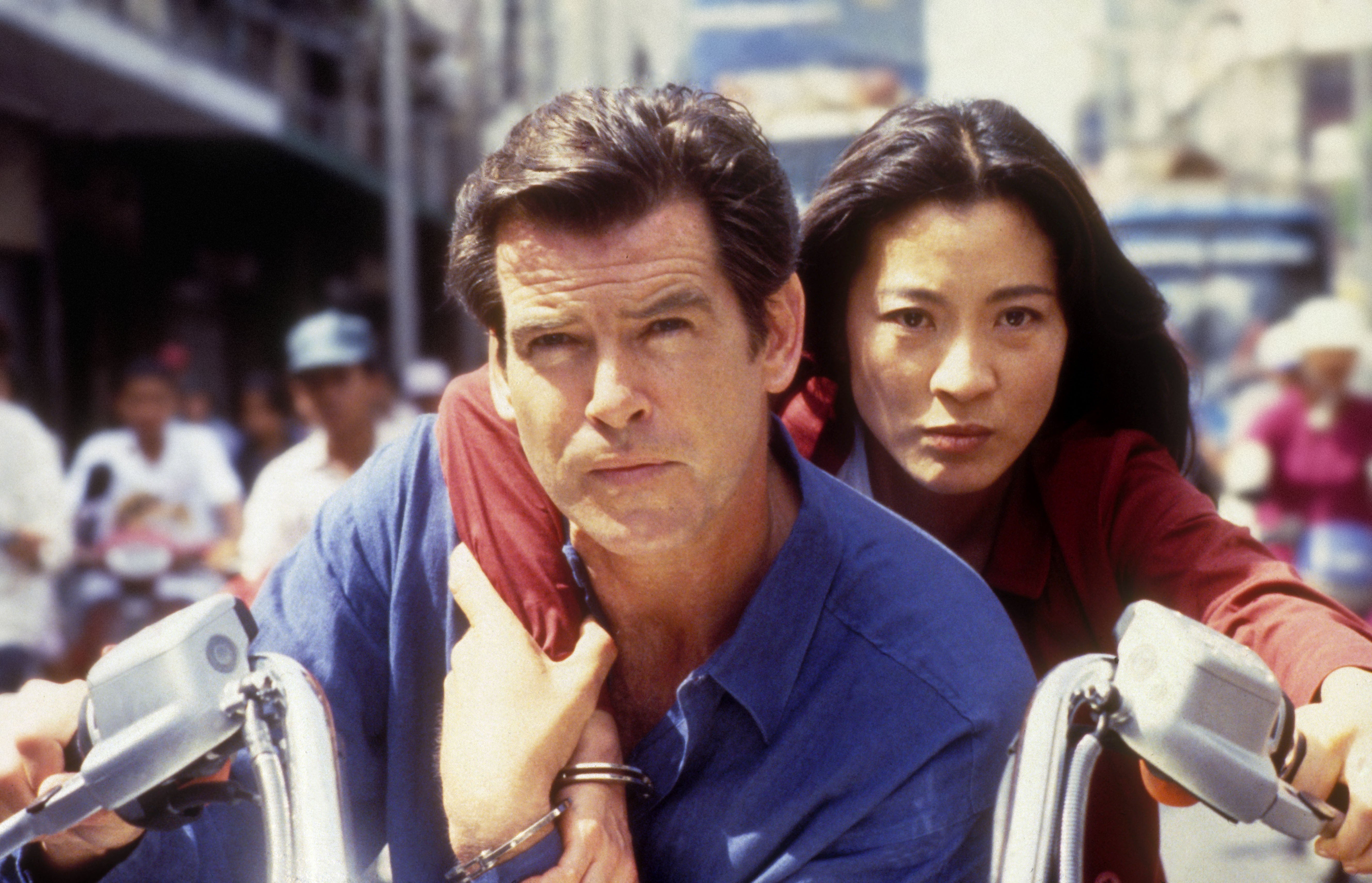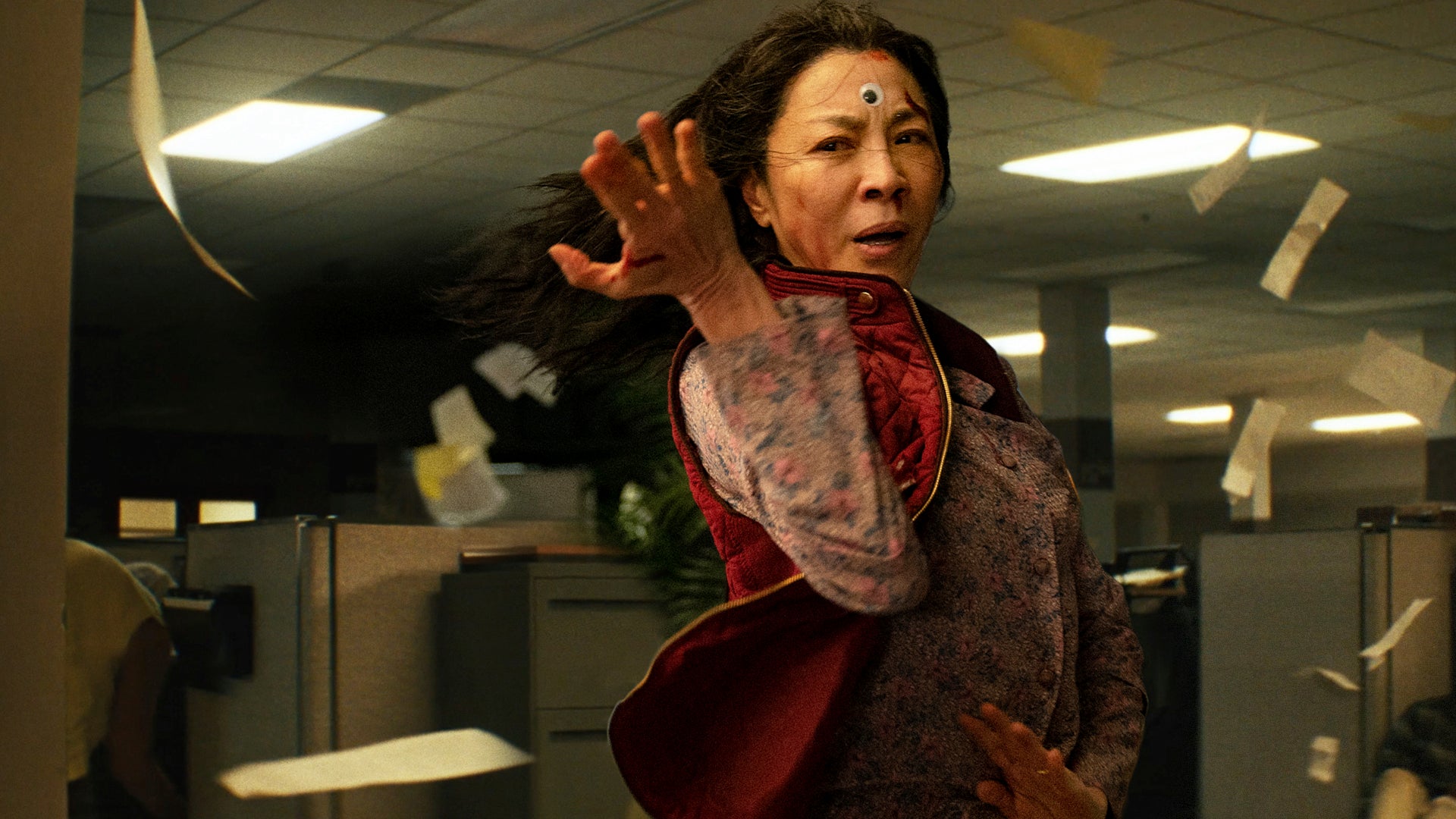
I don’t let people tell me what I can and can’t do,” says Michelle Yeoh, in a voice like polished steel. It was true 40 years ago, when she made her name as one of Hong Kong’s foremost action stars, a rare stunt maestra in an industry of men. It was true when Yeoh broke into Hollywood, redefining the term “Bond girl” as the all-action Wai Lin in Tomorrow Never Dies (1997). And it was true two years ago, when Yeoh became the first Asian woman to win a Best Actress Oscar, having fronted a thoroughly unconventional awards-sweeper – Everything Everywhere All at Once, in which she played a laundromat owner with the ability to travel across the multiverse. “It’s like, yes, you’re 60,” Yeoh says. “So that means... what? You should only play grandmothers? I’m like... ‘What? Please! The window is that way – you can jump out of it if you want.’”
As she says this, Yeoh throws out an arm towards the window of the opulent London hotel room we’re in. The Malaysian actor, 62, is sitting next to me on a sofa, her legs curled up underneath her. It’s natural, I suppose, that leaping out of windows would be on Yeoh’s mind: just weeks ago, this act punctuated the high-note climax of the hit movie musical Wicked. The film saw Yeoh play Madame Morrible, the scheming head of a magical university. “There was great pressure with Wicked,” she says, “because it’s such a beloved musical. You need the right people to come together; you need a visionary.” The film’s director, Jon M Chu, was exactly that visionary, Yeoh says.
I’m a little surprised by how innocuous she appears – if only because she seems so physically formidable in action. I’ve watched this relatively petite sexagenarian fustigate bad guys with the ease of a barrel-chested WWE wrestler. More surprising still is the revelation that Yeoh still gets anxious about interviews like this. “No joke,” she says. “Going on stage, having to do interviews... it doesn’t get easier, to be honest.”
Yeoh seems comfortable, at least, with the focus of today’s chat: the breezy and action-packed Star Trek sequel Section 31. The film, released on Paramount+ this week, is a spin-off of the TV series Star Trek: Discovery, which saw Yeoh guest star as the sturdy starship captain Philippa Georgiou. “I remember being asked to join the Star Trek family; the first thing I said was, ‘You’re not going to kill me off, right?’ This was in that period where everything [wanted to be] Game of Thrones. And then there was silence. And they go, ‘Oh, yeah, we do.’ But it’s science fiction. Anybody can come back, right?”
So come back she did, returning to the series as a dark “mirror universe” version of the same character – it is this iteration that features in Section 31. The spin-off was her idea: when Michelle Yeoh tells you she wants to front her own Star Trek project, you don’t ask too many questions. Today, she hardly seems able to bottle her enthusiasm for the film, speaking for about five minutes straight when I first bring it up. “It’s Mission: Impossible in space. It’s like Guardians of the Galaxy,” she says. “You know, the adventures of misfits – people who fall through the cracks but are given a second chance to try and do good.”
Yeoh clearly relishes the theatrics of an antihero like Georgiou – a nefarious side she also indulged with glee in Wicked – and revels, too, in the fight scenes, showcasing in flashes the sort of martial arts finesse that once made her a genre star. But it’s not quite as full-on as it once was. “I still love doing stunts. But you grow older, you get smarter and wiser... I know that nobody’s going to see me roll around the floor, or take that tumble off a chair. I have an amazing stunt double, Shara [Kim]. I’ll go, ‘Shara? You up next? I’m gonna have a cup of tea.’” She lets out a rich laugh. “But that’s what it is! When I get together with Jet Li, we sit there and go, ‘We paid our dues. They know we can do this.’ You don’t have to see me do that [now], because that’s not the point.”
Back in her heyday – her first heyday, I suppose, for many would say she’s in the throes of a second – Yeoh treated the term “stunt double” like a foreign phrase. In Supercop (1992), the third film in Jackie Chan’s awe-inspiringly kinetic Police Story saga, Yeoh performed one of the all-time great cinema stunts – landing an aerial motorcycle jump onto the top of a speeding train, then rolling off as the bike flew off the other side. “I just learnt, when I got past a point and there was nowhere else to go, to jump off the bike,” she said later. “Can you imagine doing all that?” she marvels now. Such was the astonishing feat of the stunt that American journalists didn’t believe it hadn’t been filmed on a green screen.

“When I look back at it, I go, ‘What the hell were you thinking?’” Yeoh says. Describing the logistics involved in a couple of her early stunts, she seems almost as agog as I am. “Now, with the help of CGI, it’s all done in relatively safe conditions. But in the old days, in Hong Kong, we didn’t have the luxury of that kind of budget. So they had to be creative. But it’s really too dangerous, for anyone, even a stunt person – we took a lot of risks and some people were hurt. I can say I’m glad I did it, but now, it’s not worth the risk.”
Yeoh’s first starring role was as a hard-bitten copper in 1985’s Yes, Madam!. (Two years prior to this, she had found some level of fame as the winner of the Miss Malaysia beauty pageant.) After just a few films, she married business tycoon Dickson Poon and retired from the film industry, returning five years later when the pair separated.

In her early films, Yeoh was credited as “Michelle Khan” – an unusual concession, for Yeoh, to the demands of others. “It’s like, for example, Arnold Schwarzenegger,” she says. “People look at him, and go, ‘Nobody will know how to say that name.’ Yeoh actually is very simple, one syllable. But when people read Yeoh, they try to be very extravagant.” She presses her palms over her eyes in disbelief. “So I picked Michelle for my first name, and for my surname the film company said, how about ‘King’, or ‘Khan’? It was so funny. At one stage my uncle called my dad and asked, ‘Did she get married? How come she changed?’”
It was Barbara Broccoli, the longtime James Bond producer (and now one of Yeoh’s “dearest friends”), who suggested reverting to her real name. “She said, ‘You choose – what is your name, who you are. Don’t let anybody tell you what your name is.’ I said, ‘You’re right. I love the name Michelle. But I want my own name back there.’”
I made mistakes. There’s been real downs as well, a moment or two when you go, ‘Actually, should I be doing this?’ But it’s important to have those moments
Playing 007’s ally was Yeoh’s entry point into Hollywood. Throughout the Noughties, she would become increasingly familiar to Western audiences through films such as the crossover wuxia hit Crouching Tiger, Hidden Dragon (2000), Danny Boyle’s space-set sci-fi Sunshine (2007), and the haphazard Brendan Fraser threequel The Mummy: Tomb of the Dragon Emperor (2008). But the transition wasn’t without its challenges. “I think what surprised me the most was how little they knew about the other side of the world,” she remarks. “Everyone was always asking, ‘Why do you speak English so well?’” (Yeoh grew up speaking it fluently). “I didn’t even know how to explain any more. I used to say, ‘The flight over here was really long, like 12, 13 hours, so I learnt it then.’”
Yeoh grins again. “You just have to have a sense of humour, right?” she adds. “And that was a long time ago. I’m glad now they realise that the world is a lot bigger than that.”

There is, with some of Yeoh’s answers, a rehearsed quality – the sort of steady automation that one might expect after four decades of interviews like this one. (The quip about learning English, for instance, was delivered on stage while accepting the Golden Globe for Everything Everywhere in 2023.) There’s some uniformity, too, in the way that Yeoh’s life is usually framed. Hers is a career with a real sense of narrative: the beauty queen who became an action star, cracked Hollywood, then went on to win a historic Academy award. Yeoh, though, says she spares little thought for her own arc. “I keep thinking forwards,” she says, pumping her arms in a kind of marching motion. “Because whatever happened before brought me to this point.
“I learnt along the way,” she continues. “I made mistakes. There’s been real downs as well, a moment or two when you go, ‘Actually, should I be doing this?’ But it’s important to have those moments. Every important crossroads makes a difference. But I think the most important thing is I don’t look back and regret. How do I keep forging? How do I keep climbing that hill?” She vigorously pumps her arms again.
Our interview has overrun, but Yeoh still seems full of steam. The future, she says, is bright: strides are being made when it comes to representation in the American entertainment industry. A career like Yeoh’s might not be such a hard-fought anomaly. Until Crazy Rich Asians – the hit 2018 romance in which Yeoh starred – a film such as Everything Everywhere, a quirky sci-fi comedy with a mostly Asian cast, would never have seen the light of day. “Before that, it would not have happened. There would not have been such an open-mindedness,” Yeoh says.

“I’m so deliriously happy with the results that [Hulu’s Emmy-lavished Japan-set drama] Shogun is getting... but it’s still a period piece,” she continues. “We have to find contemporary stories. Where it’s integrated. It’s moving [in the right direction]. But has it got there completely? No.”
Yeoh mentions the Asian-centric Netflix comedy she starred in last January, The Brothers Sun. “It never got picked up, and that was devastating to me,” she says. “It was funny, it was beautifully done... I don’t know what else you need. So we still need to keep pushing forward. We don’t have a choice.”
In some ways, Yeoh is still bending Hollywood to her whim, fighting for better roles, setting new precedents for Asian actors in the US. And boy, can she fight. “It’s very important you don’t let other people dictate who you are or what you do,” she says. “Especially now, at this point in my career. I have my community, where we know how to support each other. We’ll find the writers who will write something other than the ‘grandmother’.
“I’m not going to try and be a 20-year-old, because I’m not,” she adds, her face fixed in a shrewd smile. “But you don’t have to be relegated just because you’re this age.” I defy anyone on Earth to tell Michelle Yeoh otherwise.
‘Star Trek: Section 31’ is streaming now on Paramount+







